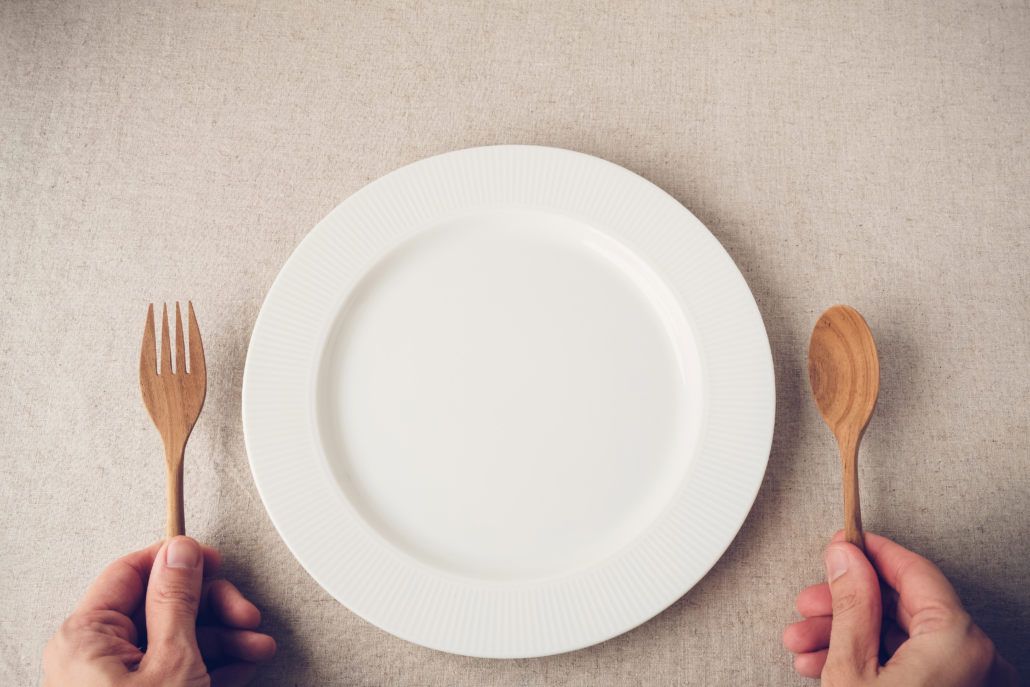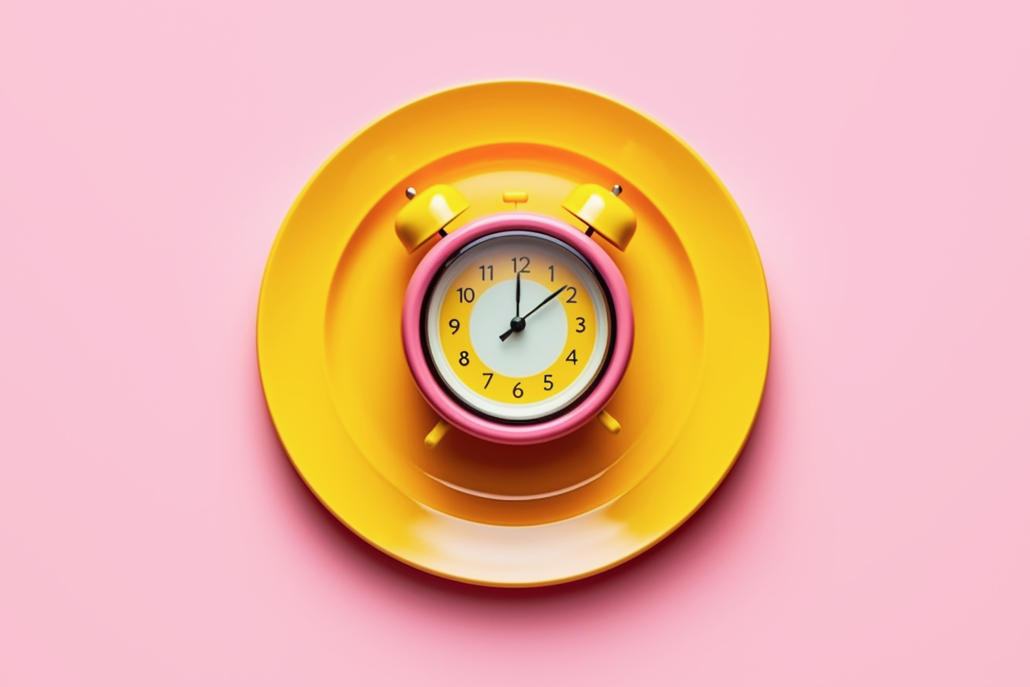We include products in articles we think are useful for our readers. If you buy products or services through links on our website, we may earn a small commission.
16/8 Intermittent Fasting: Benefits and Tips for Getting Started

Table of Contents
Intermittent fasting (IF) has exploded in recent years, and the 16/8 (AKA 16 hour) Intermittent fasting plan is the most popular.
While intermittent fasting may seem like a new trend, it has been a natural human dietary pattern since our beginnings. Modern science is just starting to realize the full extent of IF’s health benefits including reduced inflammation, improved cognitive function, and faster cellular regeneration. [1]
In this article we’ll be exploring the pros, cons, and benefits of 16/8 intermittent fasting before looking at some sample meals for how to optimally fuel your body during your fasting routine.
What is 16/8 Intermittent Fasting?
16/8 intermittent fasting is simple: it calls for fasting for 16 hours of every day, and eating for 8.
Within this 8-hour “feeding window,” you’re free to enjoy 1-3 meals. Though for most people on a well-formulated meal plan centered on nutrient-dense whole animal products, 1-2 meals do the trick.
Like any type of intermittent fasting, 16/8 intermittent fasting aims to mimic ancestral eating patterns and thereby activate our evolutionary foundation for health.
16/8 fasting has been correlated with a wide variety of health benefits, including: [2]
- Improved fat burning
- Improved weight loss
- Reduced risk of cancer
- Optimized hormone levels
- Improved cholesterol levels
- Improved body composition
- Better blood sugar regulation
- Reduced risk of heart diseases
- Increased activation of stem cells
What is 16/8 Fasting?
16/8 fasting is one of the most popular ways of bringing intermittent fasting from theory to practice.
As the name implies, it involves skipping one meal (normally breakfast, though some people skip dinner) and eating within an 8 hour time period.
Though the term 16/8 fasting is relatively new (popularized only within the last decade by bodybuilder Martin Berkhan), this type of fasting has stood the test of time. [3]
Until just recently, skipping breakfast was the norm, and an early “fast-breaking” meal was reserved for the very young, very old, and very ill.
“Breakfast was seen as medicinal,” BBC History’s Ian Mortimer writes. “People might be prescribed ‘a breakfast of…’ as a means to sustain them in illness or old age. In 1305, Edward I (then aged 65), employed a cook just to prepare breakfasts.” [4]
Other forms of intermittent fasting also have a strong historical basis. The Islam religion has Ramadan, a 28-30 day fast that prohibits food and drink during the daylight hours.
The Judaic religion also has many ceremonial fast days. Christianity espouses fasting, too — Jesus and the early apostles fasted in order to access more spiritual spaces and relate more directly to God. To this day Orthodox Christians have up to 200 days of fasting per year! [5]
How to Get Started 16/8 Intermittent Fasting
16/8 intermittent fasting is simple, safe, and surprisingly easy to get started with.
Just pick an 8-hour feeding window, eat 1-3 nourishing meals within that window, and abstain from anything except coffee and water the rest of the time.
The most popular 8-hour window is 12 pm to 8 pm. That said, 16/8 fasting is highly flexible.
You can structure it around your work schedule, workout schedule, or family time. You can eat from 12-8 on weekdays and switch things up to 8-4 or 2-10 on the weekends.
Others opt to eat between 9 am and 5 pm, which allows them to have a more standard breakfast, lunch, and early dinner. This type of circadian eating is thought to be good for digestion.
IF becomes even easier if you already skip breakfast. You’ll just need to refrain from snacking or drinking calorie-containing beverages outside of your preferred 8-hour window.
Most people find that their body adjusts to 16/8 fasting within a few days, after which the fast becomes surprisingly hunger-free.
Filling up on superfoods during your eating window can boost satiety enough to make your daily fast even easier. Consider including a nice balance of animal-based fats and proteins in each meal.
16 Hour Fasting Benefits
16/8 intermittent fasting has a wide variety of health benefits — below we’ve distilled the top four.
- Increased weight loss
- Better gut health
- Improved cognition
- A more youthful appearance
16 hour fast benefit #1: Increased weight loss
Intermittent fasting’s single most noticeable benefit is probably its ability to promote fast weight loss.
And not just any type of weight loss, either — most people who practice 16/8 IF find that most or all of the weight they lose comes in the form of fat.
How does this benefit work?
Taking a look at what happens when you eat “normally” should help explain:
When you eat three carb-rich meals along with snacks each day, the carbohydrates in your food get broken down into blood sugar (glucose) almost immediately.
Your pancreas releases insulin to shuttle this glucose into your cells, keeping blood sugar in a safe range. When insulin is high, it also locks fatty acids into fat cells.
In other words, the standard American diet does a great job at dysregulating your blood sugar and keeping you from burning fat for fuel — thereby keeping most people who follow it ‘skinny fat’ at best.
Intermittent fasting shifts your body into a radically different metabolic state.
After a few hours of fasting your muscles begin to burn fat, not carbs, for fuel, keeping your blood sugar stable in the process.
On a low-carb diet, even short intermittent fasts can shift your body into ketosis, an even deeper level of fat-burning where ketones replace glucose as the preferred fuel source.
The results of this metabolic shift are impressive. Some studies show that fasting makes your body much more insulin sensitive, while others show that it can boost your metabolic rate by 3-14%. [6][7]
Another study found that intermittent fasting helped overweight people preserve their muscle mass better than more standard calorie-restricted diets. [8]
In many ways, fasting allows you to access the known benefits of ketosis — just much faster than normal. Both ketosis and intermittent fasting work because they teach your body how to metabolize fat, not carbs, as their primary energy source.
Yet another study took these findings to their logical conclusion that intermittent fasting could curb the world’s obesity epidemic. [9]
16 Hour Fast Benefit #2: Better Gut Health
If we had to blame a single factor for the modern-day’s epidemic of chronic disease, we’d single out inflammation.
The scientific literature is clear that chronic inflammation has devastating effects on one’s health. Inflammation essentially causes poorer expression of your genes. If your mother has arthritis, for example, chronic inflammation may make you more susceptible to developing the same thing.
Thankfully fasting may help. It improves gut health enough to reduce many inflammatory markers. Its ability to promote ketosis means it can also help your body generate new, inflammation-fighting mitochondria. This process is called mitophagy. [10]
In addition to reducing inflammation (or perhaps because of this reduction), increased mitophagy has been correlated with an increased lifespan.
Rodent studies show that IF extends lifespan by 36-8%. [11][12] It’s possible that a similar effect is seen in humans, though more research is needed before we can know for sure.
Fasting also reduces inflammation by relieving your digestive tract from the burden of non-stop digestion. It uses this time off to regenerate the gut lining, reducing your risk of leaky gut syndrome and preventing harmful endotoxins from escaping the digestive tract. [13]
16 Hour Fast Benefit #3: Improved Cognition
Studies show that intermittent fasting boosts several hormones, notably Brain-Derived Neurotrophic Factor (BDNF), that are neuroplastic and neurodegenerative in nature.
In other words, fasting provides the perfect fuel for your brain. Increased BDNF levels are associated with improved mood, cognition, productivity, memory, and creativity. Harvard neuropsychiatrist John J. Ratey calls BDNF “Miracle-Gro for the brain.” [14]
It’s not known why intermittent fasting boosts BDNF so powerfully, but our evolution may give us some hints.
Throughout human history most tribes and people groups would’ve gone long stretches without food, say before their next successful hunt. During this time, peak physical and mental performance would’ve been paramount to securing the next meal — and the body would’ve met this need.
To this day it’s thought that the human body perceives fasting as a healthy stressor and responds by forming new neurons that prime your body to learn new skills. In this type of emergency situation, BDNF allows our brains to form new neural networks quickly. [15]
16 Hour Fast benefit #4: A More Youthful Appearance
In more recent times fasting has become known for its ability to turn back the biological clock. Many people who take up intermittent fasting notice dark under-eye circles disappearing and fine lines smoothing out.
These benefits may sound too good to be true, but they’re backed by science. Recent studies have shown that intermittent fasting boosts human growth hormone or HGH. Fasting for just 24 hours can boost HGH levels by 1300-2000%! [16]
HGH is an essential hormone that helps build and repair tissues as diverse as your skin, brain, and other organs. By improving cellular turnover, HGH may help your skin look fresher and more youthful. It may also increase your body’s muscle mass, in turn making fat loss even easier. [17]
Drawbacks to 16/8 Fasting and How to Avoid Them
While 16/8 intermittent fasting is associated with many health benefits, it does have some potential drawbacks.
These include overeating, low energy, high levels of stress hormones, and fertility problems.
Potential drawback: overeating
16/8 intermittent fasting’s restricted eating window may backfire on those with large appetites, who may be prone to overeating if they get too hungry during the fasting window. This can lead to weight gain, digestive issues/bloating, and an unhealthy relationship with food.
Most people naturally eat less with IF when enjoying a well-formulated diet of healthy whole foods. So don’t let this potential drawback discourage you from giving 16/8 fasting a try.
Potential Drawback: Low energy
Some people find 16/8 intermittent fasting tough to get started with. People with high metabolisms may experience weakness and fatigue during their first few days.
These side effects can be especially pronounced if you’re also transitioning from a standard American diet to keto/carnivore.
Potential Drawback: High Stress Hormones
With the shift from carbohydrate to fat metabolism comes another type of shift: a hormonal one.
As your body gets used to burning fat for fuel, it may utilize stress hormones like cortisol to liberate amino acids and fats from your reserves. This process can feel stressful until your body becomes efficient at fat burning, at which point cortisol levels return to normal. [18]
Potential Drawback: Fertility Problems
Some research in animals hints that intermittent fasting may impair female fertility. It’s likely that this is caused by calorie deficiency, rather than by the practice of fasting itself, as pregnancy is a very energy-intensive practice.
Consider holding off on IF if you’re pregnant or trying to become pregnant! [19]
Men, on the other hand, can likely engage in IF without impairing their fertility rates.
There are also fasting strategies tailored specifically to female needs.
How to avoid overeating
There’s an easy solution if you’re struggling with overeating on a 16/8 IF plan: just eat more fat. Consider adding tallow, butter, and olive oil to your low-carb veggies.
Also be sure to eat slowly, which can give your body’s hunger hormones and satiety signals time to catch up with your eating.
Eggs are another extremely satiating food that’s convenient and nutrient-loaded.
How to Avoid Low Energy
Acclimating to intermittent fasting is similar to acclimating to the keto diet. In both cases, anything that helps you move toward fat-burning mode will help you make the transition. Supplementing with MCT oil, coconut oil, and other healthy fats may help with ketone production and overall acclimation.
Upping your caffeine intake a little may also help you avoid low energy, since caffeine helps your body mobilize fatty acids as fuel. [20]
How to Avoid High Stress Hormones
Avoiding the cortisol increase that accompanies fasting can be done by many of the same things we mentioned above.
Drinking coffee with some clean-burning MCT oil or coconut oil mixed in may well be enough to help your body transition with a minimum of stress.
Partaking in gentle activities, like swimming or yoga, may also get your mind off of food and your body into fat-burning mode.
Is 16/8 Fasting Right for you?
If you’re trying to lose weight, improve your body composition, boost your brain function, and/or fight off aging…
…then probably so.
However, several groups should probably err on the side of caution and avoid intermittent fasting.
Women who are pregnant (or want to become pregnant)
Women’s hormonal status makes them more sensitive to calorie restriction than men. [21] Women who are pregnant or trying to become pregnant should err on the side of caution.
There are a number of gentler fasting plans for women that you can learn about here.
Hard-training athletes
Hard-training athletes typically do better eating throughout the day, too. Their high calorie demands mean that time-restricted eating can make getting enough energy impossible. Training in an energy deficit may be good for weight loss, but it’s not good for peak athletic performance.
People Who Want to Gain Weight
If you’re underweight due to health problems or high activity levels, then fasting of any sort is probably not for you. Instead, consider placing an added emphasis on healthy fats and other nourishing animal products.
16/8 Fasting Meal Plan
Need some ideas on what to eat while 16/8 intermittent fasting? The following 16 hour fast protocol is full of 16/8 diet power foods.
| Day 1 | Day 2 | Day 3 | Day 4 | Day 5 | Day 6 | Day 7 | |
| Lunch | Lox and eggs with creme fraiche | Eggs fried in ghee, 1 tin sardines | Mediterannean keto Greek keto frittata | Tuna Salad with homemade mayo, creme fraiche, and olive oil | Lox and eggs scrambled with creme fraiche | Arctic Char with butter, blackberries with creme fraiche | Eggs with creme fraiche, macadamia nuts, coconut manna |
| Dinner | 12 oz. Beef short ribs | Mediterranian keto bacon lettuce wraps with bacon, labneh, homemade mayo, basil, lemon | Salmon Belly, oysters, and creme fraiche | 12 oz. Beef short ribs | 8 oz Tri-tip roast, Sweet Potato with ghee | 6.5 oz Bison burger with 1.5 oz liver blended in | Salmon Belly, oysters, and creme fraiche |
16/8 Fasting: The Takeaway
16 hour Intermittent fasting is a proven way to maintain optimal body composition and cognitive health. Humans have been fasting since time began — why stop now?
If you have any questions it is a good idea to talk to your doctor before beginning any fasting regimen. And consider supplementing with organ meat supplements to stay nutritionally complete during your new way of eating. We think you’ll love intermittent fasting (or is it intermittent feasting?) just as much as we have!















